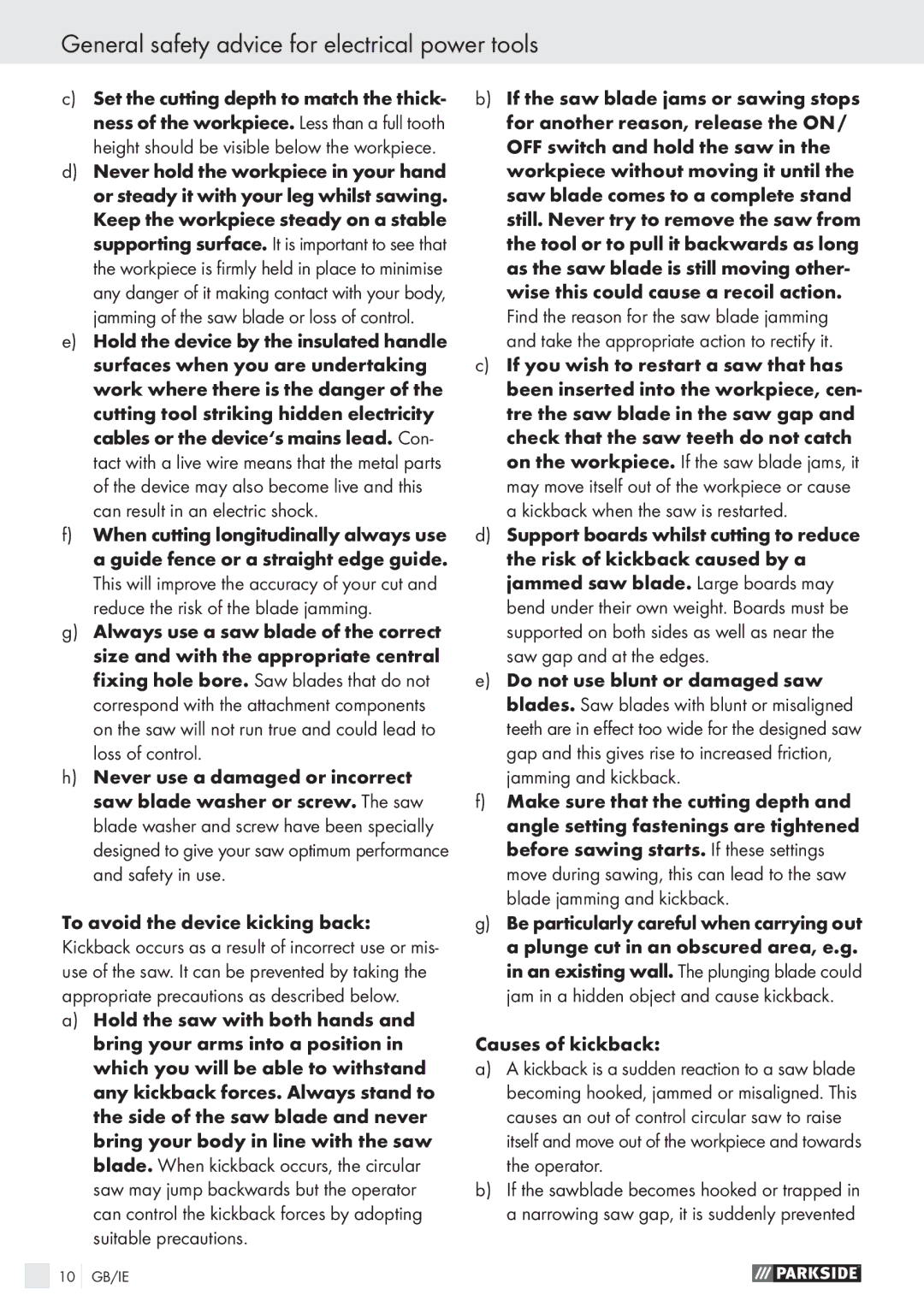
General safety advice for electrical power tools
c)Set the cutting depth to match the thick- ness of the workpiece. Less than a full tooth height should be visible below the workpiece.
d)Never hold the workpiece in your hand or steady it with your leg whilst sawing. Keep the workpiece steady on a stable supporting surface. It is important to see that the workpiece is firmly held in place to minimise any danger of it making contact with your body, jamming of the saw blade or loss of control.
e)Hold the device by the insulated handle surfaces when you are undertaking work where there is the danger of the cutting tool striking hidden electricity cables or the device‘s mains lead. Con- tact with a live wire means that the metal parts of the device may also become live and this can result in an electric shock.
f)When cutting longitudinally always use a guide fence or a straight edge guide. This will improve the accuracy of your cut and reduce the risk of the blade jamming.
g)Always use a saw blade of the correct size and with the appropriate central fixing hole bore. Saw blades that do not correspond with the attachment components on the saw will not run true and could lead to loss of control.
h)Never use a damaged or incorrect saw blade washer or screw. The saw blade washer and screw have been specially designed to give your saw optimum performance and safety in use.
To avoid the device kicking back: Kickback occurs as a result of incorrect use or mis- use of the saw. It can be prevented by taking the appropriate precautions as described below.
a)Hold the saw with both hands and bring your arms into a position in which you will be able to withstand any kickback forces. Always stand to the side of the saw blade and never bring your body in line with the saw blade. When kickback occurs, the circular saw may jump backwards but the operator can control the kickback forces by adopting suitable precautions.
b)If the saw blade jams or sawing stops for another reason, release the ON / OFF switch and hold the saw in the workpiece without moving it until the saw blade comes to a complete stand still. Never try to remove the saw from the tool or to pull it backwards as long as the saw blade is still moving other- wise this could cause a recoil action. Find the reason for the saw blade jamming and take the appropriate action to rectify it.
c)If you wish to restart a saw that has been inserted into the workpiece, cen- tre the saw blade in the saw gap and check that the saw teeth do not catch on the workpiece. If the saw blade jams, it may move itself out of the workpiece or cause a kickback when the saw is restarted.
d)Support boards whilst cutting to reduce the risk of kickback caused by a jammed saw blade. Large boards may bend under their own weight. Boards must be supported on both sides as well as near the saw gap and at the edges.
e)Do not use blunt or damaged saw blades. Saw blades with blunt or misaligned teeth are in effect too wide for the designed saw gap and this gives rise to increased friction, jamming and kickback.
f)Make sure that the cutting depth and angle setting fastenings are tightened before sawing starts. If these settings move during sawing, this can lead to the saw blade jamming and kickback.
g)Be particularly careful when carrying out a plunge cut in an obscured area, e.g. in an existing wall. The plunging blade could jam in a hidden object and cause kickback.
Causes of kickback:
a)A kickback is a sudden reaction to a saw blade becoming hooked, jammed or misaligned. This causes an out of control circular saw to raise itself and move out of the workpiece and towards the operator.
b)If the sawblade becomes hooked or trapped in a narrowing saw gap, it is suddenly prevented
10
GB/IE
